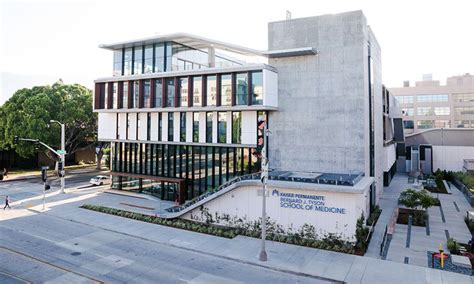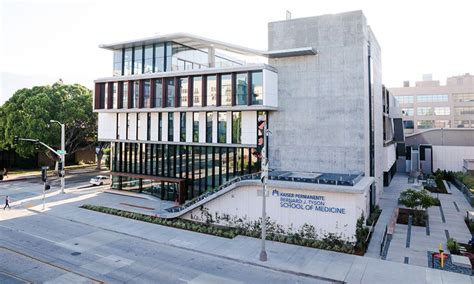Intro
Discover the Kaiser Permanente School of Medicine, a pioneering institution revolutionizing medical education. Learn about its innovative curriculum, emphasis on primary care, and commitment to diversity and inclusion. Explore the schools unique approach to healthcare education, preparing students for a rapidly changing medical landscape.
The Kaiser Permanente School of Medicine is a revolutionary institution that is changing the face of medical education. As a relatively new player in the field, having opened its doors in 2019, the school has already made a significant impact on the medical community. In this article, we will delve into the details of the Kaiser Permanente School of Medicine, exploring its mission, curriculum, faculty, and more.

Mission and Values
The Kaiser Permanente School of Medicine is built on a strong foundation of values that prioritize patient-centered care, diversity, and innovation. The school's mission is to prepare physicians who are equipped to thrive in a rapidly changing healthcare landscape, with a focus on delivering high-quality, patient-centered care.
The school's values are reflected in its commitment to diversity, equity, and inclusion, as well as its emphasis on community engagement and social responsibility. By instilling these values in its students, the Kaiser Permanente School of Medicine aims to produce physicians who are not only exceptional clinicians but also compassionate and empathetic individuals who are dedicated to improving the health and well-being of their patients and communities.
Curriculum and Program Structure
The Kaiser Permanente School of Medicine offers a four-year Doctor of Medicine (M.D.) program that is designed to provide students with a comprehensive education in the art and science of medicine. The curriculum is built around a number of key themes, including:
- Patient-centered care
- Community health and social determinants of health
- Health systems science and medical informatics
- Clinical skills and professionalism
The program is divided into two phases: the pre-clerkship phase, which focuses on foundational sciences and clinical skills, and the clerkship phase, which provides students with hands-on experience in a variety of clinical settings.
Faculty and Research
The faculty at the Kaiser Permanente School of Medicine are a diverse and accomplished group of educators, researchers, and clinicians who are dedicated to providing students with a world-class education. Many of the school's faculty members are renowned experts in their fields, with a strong track record of research and publication.
The school is also committed to research and innovation, with a number of initiatives and programs aimed at promoting medical discovery and advancement. Students have opportunities to engage in research projects and collaborate with faculty members on a wide range of topics, from basic sciences to clinical trials.

Admissions and Financial Aid
The Kaiser Permanente School of Medicine is a highly competitive institution, with a rigorous admissions process that selects students who are not only academically talented but also passionate about pursuing a career in medicine.
The school offers a range of financial aid options, including scholarships, grants, and loans, to help students fund their education. The school is also committed to diversity and inclusion, with a number of initiatives aimed at promoting diversity and reducing barriers to access.
Clinical Partnerships and Community Engagement
The Kaiser Permanente School of Medicine has a number of clinical partnerships and community engagement initiatives that provide students with opportunities to gain hands-on experience in a variety of clinical settings.
The school has partnerships with a number of healthcare organizations, including Kaiser Permanente, which provides students with access to a wide range of clinical sites and mentors. Students also have opportunities to engage in community-based projects and initiatives, which help to promote health and well-being in underserved communities.

Student Life and Campus Culture
The Kaiser Permanente School of Medicine has a vibrant and inclusive campus culture that promotes student well-being and success. The school offers a range of student organizations and activities, from cultural events to community service projects, which help to foster a sense of community and connection among students.
The school's campus is located in Pasadena, California, which provides students with access to a wide range of cultural, recreational, and educational opportunities.
Accreditation and Recognition
The Kaiser Permanente School of Medicine is accredited by the Liaison Committee on Medical Education (LCME), which is the accrediting body for medical schools in the United States.
The school has also received recognition for its innovative curriculum and commitment to diversity and inclusion. In 2020, the school was recognized as one of the top medical schools in the country for diversity and inclusion by the American Medical Association (AMA).

Conclusion
The Kaiser Permanente School of Medicine is a pioneering institution that is revolutionizing medical education. With its focus on patient-centered care, diversity, and innovation, the school is producing physicians who are equipped to thrive in a rapidly changing healthcare landscape. We invite you to learn more about the Kaiser Permanente School of Medicine and its mission to shape the future of medicine.
What is the mission of the Kaiser Permanente School of Medicine?
+The mission of the Kaiser Permanente School of Medicine is to prepare physicians who are equipped to thrive in a rapidly changing healthcare landscape, with a focus on delivering high-quality, patient-centered care.
What is the curriculum structure of the Kaiser Permanente School of Medicine?
+The curriculum is divided into two phases: the pre-clerkship phase, which focuses on foundational sciences and clinical skills, and the clerkship phase, which provides students with hands-on experience in a variety of clinical settings.
What kind of clinical partnerships does the Kaiser Permanente School of Medicine have?
+The school has partnerships with a number of healthcare organizations, including Kaiser Permanente, which provides students with access to a wide range of clinical sites and mentors.
